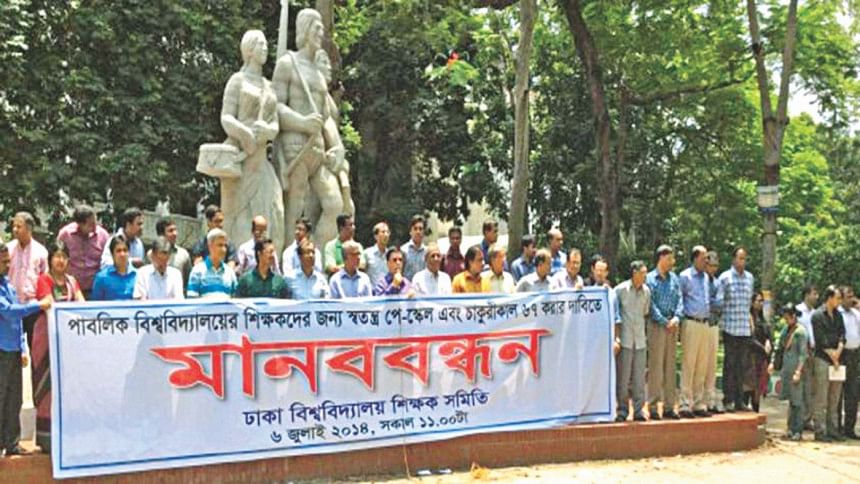The justification of imposing VAT is not very strong: Professor Nazrul Islam

The Daily Star: Public universities of Bangladesh rank low in global rankings. What, according to you, are the challenges in the higher education sector in Bangladesh? What is UGC doing to tackle these challenges?
Nazrul Islam: Giving scope for admission to all aspiring candidates who have the desire to study in universities is one challenge. The other big challenge is providing quality education. Maintaining or enhancing the quality of education has been extremely difficult over the years. The number of universities has increased, but the demand can still not be fulfilled.
Since the establishment of private universities in 1992, the trend of going abroad for higher education has been largely reversed. Now we have more than 80 approved private universities in the country. So the quantity challenge has been satisfied to a large extent. But the challenge of quality is still there. We say, in higher education, there are three sides of a pyramid: access, affordability and quality. The tuition in the public universities is almost insignificant but other expenses – living expenses, cost of books, etc. - are quite high. In private universities, the tuition is extremely high. It is beyond the reach of middle class families.
Quality education means quality infrastructure facilities -- classrooms, library, laboratory, etc. Then there's the need to employ quality faculty and administrative staff. That's how education becomes expensive in good universities. But there are many private universities which do not worry so much about the quality but are mostly interested in getting more students.
UGC is in charge of bringing in funds from the government and distributing it to the public universities, according to certain criteria, while it also processes the approval for the establishment of private universities. Although it is called a Grants Commission, UGC does not provide grants to private universities at all. So, maybe the UGC should not be called a 'Grants Commission' any more. It should better be called the University Commission.

TDS: The new proposed pay scale of public university teachers is lower than that of military and civil bureaucrats. What's your view on that?
NI: Their protest is very legitimate. The pay scale of the university teachers should not be below civil servants. If you look at the neighbouring countries -- India, Pakistan, Sri Lanka -- you will see that their teachers are paid two to three times more than the teachers in Bangladesh. If you want to attract high quality faculty, you must pay them well. Senior professors of public universities were always at par with the secretaries and so on. In fact, university teachers should be paid higher than civil servants. We don't have senior professors, we have senior scale professors. That means only a portion, maybe one third or one fourth of all professors are given senior scale grade. In Sri Lanka, they have a grade of teachers who are called senior professors, similar to how we have senior secretaries in Bangladesh. Of course, the number of senior secretaries is very limited, maybe 10 or 20. The number of secretaries is also limited, maybe 100. But the number of professors in public universities is quite high. So one can question why there should be so many professors or senior scale professors. If we have a smaller number, maybe we can demand much higher salaries for them. But our tradition has been to keep a similarity between the civil servants and university professors, which should be maintained.
TDS: Do you think that 7.5 percent VAT on private universities is logical? Why should the burden fall on students instead of the universities?
NI: In some countries, like the Philippines, there are two kinds of private universities – profit and non-profit. Universities which declare themselves to be for profit are normally taxed but non-profit universities are normally exempt from tax. In Bangladesh, both private and public universities declare themselves to be non-profit institutions. That means the justification of imposing taxes including VAT is not very strong.
However, if the government imposes a VAT, the pressure actually falls on the students. These universities are developed from tuitions and other fees taken from students. Donations and contributions are also a part but the main income of these universities is tuition fees. The year-end balance will probably show you that the profit is more than the expenditure. But because they are declared as non-profit, this surplus has to be reinvested in the development of the universities. Some private universities have invested in improving the quality of their universities, which is praiseworthy.
Thus, it depends on how we look at it, how the NBR looks at it. The reason for imposing the VAT could be that they found that the money has not been properly invested for the welfare of the university, and a lot of money has probably been channeled out or invested wrongly.
The government or the UGC should closely monitor whether students are unnecessarily burdened or whether tuition fees are disproportionately high compared to the income of the guardians. In private universities, it is not only tuition fees but other expenses like development fees or convocation fees that a student has to pay. Convocations do not necessarily have to be very expensive. Similarly, all other events can be done at a low cost. The basic objective should be for private universities and the government to keep the tuition as low as possible, while ensuring quality education.

 For all latest news, follow The Daily Star's Google News channel.
For all latest news, follow The Daily Star's Google News channel. 



Comments